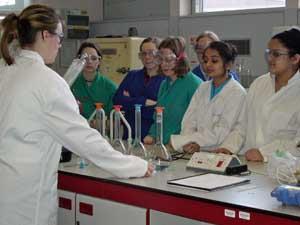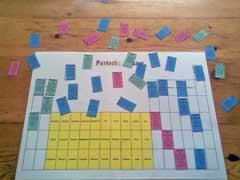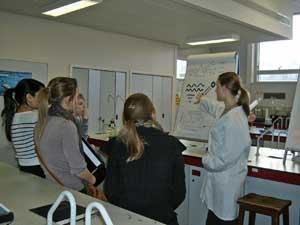Undergraduate chemists get the opportunity to teach as part of their degree course
-
Undergraduates can now go into schools and colleges as part of their BSc chemistry course and learn how to teach
- Ambassadors gain credits towards their degree course

Many schools and colleges in the UK are finding it increasingly difficult to recruit specialist science teachers.1 Without these teachers, the country has little hope of motivating high-quality students to study science post-16. The Undergraduate Ambassadors' Scheme (UAS), which aims to encourage science graduates into teaching, addresses these issues and is beginning to bear fruit
The Undergraduate Ambassadors' Scheme (UAS)2 was launched in 2002 by the then Training Development Agency in response to a growing shortage of subject specialist science and maths teachers in secondary schools and colleges in the UK. The basic principle of the UAS is straightforward - ie that science students spend some time during their degree on a placement in a local school or college for which they can earn academic credits that go towards their degree. UAS is offered to students as a course module which may count from 10-40 credits (each year of a UK university degree course counts as 120 credits).
The UAS today
Six years ago 28 undergraduates from four university departments signed up to the scheme. There are now over 600 undergraduates from 107 departments, in 41 different universities working as 'ambassadors' in over 300 schools and colleges around the country. Originally the participating undergraduates came from maths and physics departments but since then many other departments have become involved in the scheme - chemistry, biology, computer sciences, electronics, engineering, environmental science, food sciences, geography, geology, modern languages, music, natural science, oceanography, plant science and sports science. In addition the UAS has been endorsed by over 13 different professional bodies and councils, including the Royal Society of Chemistry (RSC).
The scheme is run by the university and departments can tailor it to meet their own requirements. What is important is that all parties involved - undergraduates, teachers, pupils and universities - benefit from participating in the scheme. To support universities the UAS provides information on:
- module structure;
- assessment methods;
- recruiting undergraduates;
- identifying teachers and working with schools;
- preparation and training for undergraduates and teachers;
- support and monitoring for undergraduates.3
A typical placement contains a number of elements. In the main students are expected to provide teaching assistance. Each student must also do an individual project, which they develop throughout their time in the school or college. (Projects which have been done by Reading students are listed in Box 1.) Ideas for projects are discussed with the teacher after the first few weeks of the placement. Sometimes students have specific ideas of what they want to do, others are happy to be led by the teacher and work with the science department to produce a resource or do an investigation which will be of value to the school. All projects, however, must meet the following requirements of the module and include:
- background research, which involves reading the relevant literature, planning and doing surveys of, for example, pupils' ideas, or of products and resources currently available;
- a developmental stage, incorporating the results of the surveys;
- trialling in school or college and a full evaluation;
- a written report and an oral presentation to staff, teachers and fellow students at the university. Students are also encouraged to publish the outcomes of these projects in the educational literature.
Since academic credits are awarded for the module, the final written report and an oral presentation must be assessed. This is done by the university, though the supervising teacher may also play a part. However, the UAS is clear that assessment should not lead to extra work for teachers. Indeed, it is hoped that in many cases the presence of good quality students within a school will reduce workloads.
Box 1 - Special projects
Project topics vary widely and some done by Reading UAS students include:
- research into the factors which are likely to encourage girls into science in secondary schools and a study of the impact of teaching girls and boys separately in science in Years 10 and 11;
- producing a booklet aimed at chemistry students starting university to bridge the A-level-university gap;
- integrating forensic science teaching into GCSE-level chemical analysis;
- producing a booklet and a DVD on: Post-18 study - how to make an informed choice about whether university is the right career pathway. Both are used by the department on UCAS visit days to illustrate university life and what it's like to study chemistry at Reading;
- resources for gifted and talented pupils, including a Periodic Table 'jigsaw' which can be used at any level;
- helping students debate issues such as the energy crisis and genetic modification as part of the new 'Science in Society' GCSE syllabus;
- investigating the role played by practical work in the study of chemistry;
- investigating different learning styles.
The Reading experience
At Reading we took an initial decision that for the UAS to be useful students should spend a significant amount of time at a school and should receive an appropriate number of academic credits. To accommodate this within our course structure we offer a UAS placement as a 40-credit final-year project - as an alternative to a traditional laboratory-based project - to students on our three-year BSc programmes. The UAS is not an option for our MChem students because we feel they should do chemistry research projects to prepare them for possible postgraduate research.

Two years on, the short-term benefits to our BSc students, teachers and pupils are clear. We have compared the performance of students on two identical BSc degree programmes where the only difference was whether they took an education- (as part of UAS) or a lab-based research project. For those taking an education project, average marks improved from 65 per cent at part two to 72 per cent at part three with an average project mark of 74 per cent. For those taking a lab-based project, average marks improved from 57 per cent at part two to 60 per cent at part three with an average project mark of 63 per cent. This is a clear demonstration of the overall beneficial effect on those students involved in the UAS scheme.
In addition students gain enormously in all-important transferable skills - communication (both oral and written), team-working, independent working and prioritisation of open-ended work. The UAS students also tend to score higher marks in other modules probably a result of gaining confidence and maturity during their placements.
The UAS programme has grown in popularity among the students. The first year that we ran the programme, in 2006-7, we placed four students in schools; the following year, with a limited but expanding number of placements available, we had to interview students to select those most suitable because there was so much competition. Two of these students have now obtained first-class chemistry degrees and both have gone on to do a PGCE.
Box 2 - Teachers' views
Mike Vaughan, the Waingels College, Reading, comments:
We feel that the UAS scheme provides a 'win win' situation for all involved. The university students develop valuable interpersonal skills which will be needed in whatever sphere of life they embark upon. They also get a feel for school life from a different perspective than their own experiences and can make an informed decision about applying for teacher training courses if that is the direction they are aiming for.
Our pupils get the opportunity to interact with real scientists who provide excellent role models. This should have an impact upon the number of students opting for post-16 science courses and beyond. From my own point of view, I get the opportunity to learn about new developments in both chemistry and education. Mentoring these young people has prompted me to reflect upon my own teaching practice and think about how I present science to today's students.
Our UAS student last year, Tom, chose to tackle a huge area of study in his special project by looking at active learning and the way practical classes support the learning process. This year, our 'ambassador' Laura has reviewed our practice of teaching boys and girls separately for science from Year 9 upwards and has made some interesting findings which will help to inform our teaching.
David Wright, Kendrick School, Reading, comments:
Helen, a natural sciences student, worked with Year 10 and Year 12 pupils to produce revision materials for the new AQA chemistry GCSE syllabus. This involved a thorough review of materials currently available commercially and research into the types of revision materials and styles of learning the girls prefer.
Catherine, who is studying chemistry with forensic analysis, worked with two groups of Year 11 pupils on the AQA chemistry course. She produced an excellent booklet summarising the main points of structure and bonding and a question and answer workbook on the same topic. She also taught the pupils how to do qualitative tests, related to forensic science. At the end of term the pupils used their knowledge to do a series of forensic tests and found out about how evidence is collected at a crime scene. The pupils responded well to these lessons.
Independent evaluation
A full evaluation of the UAS scheme was done in 2006.3 The report demonstrates the continuing success of the UAS. This is in line with feedback we have had at Reading (see Boxes 2 and 3). We find that the scheme is helping to attract high-quality science graduates into teaching which is crucial to the long-term future of the UK science community as a whole. National figures showed that in 2005/6 28 per cent of undergraduates applied for an Initial Teacher Training course after completing the scheme, an increase of 119 per cent on 2004/5.3 At Reading typically around 50 per cent of students on the UAS scheme apply for PGCE courses.
The report also suggests that participating in the scheme helps students to make a more informed decision about their choice of career, with a decrease in the numbers who were undecided about teaching as a profession before embarking upon the scheme.
Of the teachers surveyed who had been involved in the scheme 95 per cent felt that their UAS student had increased the enthusiasm of all or some of their students for STEM subjects, and around a quarter claimed that the student had helped them update their subject knowledge and contributed to their own continual professional development. Nearly all teachers gain in some way from the reusable resources created by their UAS undergraduate.
The report also highlighted some concerns, which have subsequently been addressed. There are, for instance, some small, but not insignificant, costs associated with running the scheme. All undergraduates working with children must undergo Enhanced Disclosure Checks (CRB checks) which are fairly costly. Departments must also consider whether they can help students with travel costs and there are the usual indeterminate expenses associated with conducting such a scheme in a professional manner. In 2007 the scheme received additional funding from the RSC,4 and more recently the Ogden Trust put money into the UAS to help recruit new physics and mathematics departments onto the scheme. However, there are still the ongoing costs to find for new students every year.
Another concern raised in the report was that of quality assurance (QA). This is particularly important for us where the UAS scheme is worth around one fifth of the total overall marks for the degree classification. However, the module passed all the internal QA procedures and the external examiners, who were advised in advance of the scheme, expressed strong satisfaction that Reading University chemistry department had embarked on this scheme. Moreover, the group implementing the UAS at Reading has recently been awarded a University Team Teaching Award, thus further endorsing its status.

Box 3 - Students' views
Ambassador Sam Phelps, comments:
Spending time in a secondary school is one of the best opportunities for gaining valuable work experience for any student thinking of teaching. The UAS project has given me the chance to find out if I have what it takes to handle students in the classroom. The skills I have developed over the past year in school will be of use to me in any career I choose.
Ambassador Claire Nimmo comments:
One part of my project involved organising a visit to the university for pupils from all the local schools participating in the UAS scheme. About 90 Year 12 students from six secondary schools attended the afternoon which included short talks about university life, finance, applying through UCAS and potential careers in chemistry.
The pupils then split into groups - some did spectroscopic analysis, others had a go at fingerprinting and 'blood' analysis, while other groups saw some colourful and loud demonstrations related to AS-level chemistry topics. The feedback from the pupils was positive.
Working on the UAS project this year has really helped me gain some important organisation skills both in and out of the classroom.
And the school pupils?
Probably the greatest benefit of the scheme to school pupils is the presence of a positive role model in the classroom who is closer to their age and who can give first-hand advice about going on to university and making career choices.
One pupil commented that the student ambassador at her school: '.gave personal feedback from their experience at university which made me feel more confident about going to university myself. She explained to us what university life is like outside of lecture theatres which is helpful because we don't know what's involved and what opportunities you have there.' Several pupils also said that their ambassador had made them feel more confident and found it helpful to talk to them about the financial side of going to university.
Interested?
Anyone interested in adopting the scheme or hosting a student should contact the UAS (e-mail: Brian.Lockwood@uas.ac.uk) or their local university to find out which departments take part in the scheme.
Dr Elizabeth Page is director of undergraduate studies and school director of outreach in the school of chemistry at the University of Reading, Whiteknights, Reading RG6 6AD, and Dr Matthew Almond is head of department at the same institution.
Related Links
Science News
The Undergraduate Ambassadors Scheme (UAS)
References
- A State of the Nation report, The Royal Society, London, 2007. Available online from Website below.
- Undergraduate Ambassadors' Scheme website below
- UAS 2004-5 report: See Website
- Educ. Chem., 2007, 44(2), 37.






No comments yet